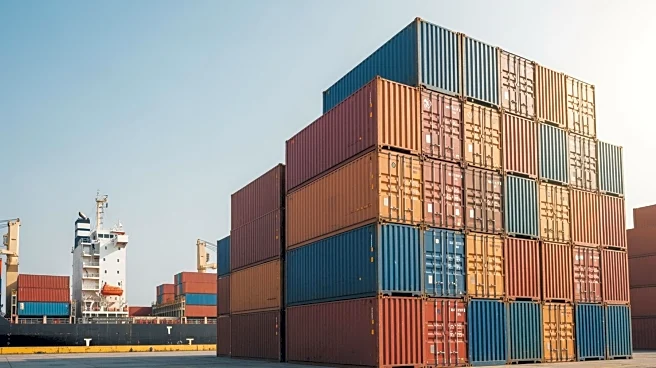What's Happening?
Maersk, a leading container shipping company, reported better-than-expected third-quarter results, highlighting a seven percent increase in volumes driven by strong exports from East Asia and China. Despite
this positive performance, investor concerns persist due to declining freight rates, which have fallen below Maersk's breakeven level. The company experienced an 18 percent drop in revenues from its ocean division compared to last year, and a significant decrease in income (EBITDA) during the third quarter. Maersk CEO Vincent Clerc dismissed fears of 'de-globalization' and emphasized the company's strong terminal operations and logistics margins. However, the uncertainty surrounding the containership orderbook and rerouting away from the Red Sea are expected to impact future results.
Why It's Important?
The decline in freight rates poses a significant challenge for Maersk and the broader shipping industry, affecting profitability and investor confidence. As a bellwether for the global economy, Maersk's performance is closely watched, and its ability to adapt to changing market conditions is crucial. The company's revised forecast of four percent growth for the year, up from an earlier estimate, indicates resilience but also highlights the pressure from external factors such as new ship deliveries and trade route changes. Investors' disappointment with Maersk's unchanged income forecasts for 2025 led to a five percent drop in share price, reflecting broader concerns about the industry's future stability.
What's Next?
Maersk plans to continue adapting its operations to maintain stability across supply chains, leveraging cost savings and improved logistics margins. The company is expected to address investor concerns by providing more detailed forecasts in early 2026. The industry will closely monitor the impact of new ship deliveries and potential excess capacity on freight rates. Maersk's strategic decisions regarding trade routes and partnerships, such as the Gemini Cooperation with Hapag-Lloyd, will be critical in navigating these challenges.
Beyond the Headlines
The ongoing uncertainty in the shipping industry underscores the need for strategic adaptability and innovation. Maersk's focus on logistics and terminal operations may offer a competitive edge, but the broader implications of trade pattern shifts and geopolitical tensions remain significant. The industry's response to these challenges could influence global trade dynamics and economic stability.









